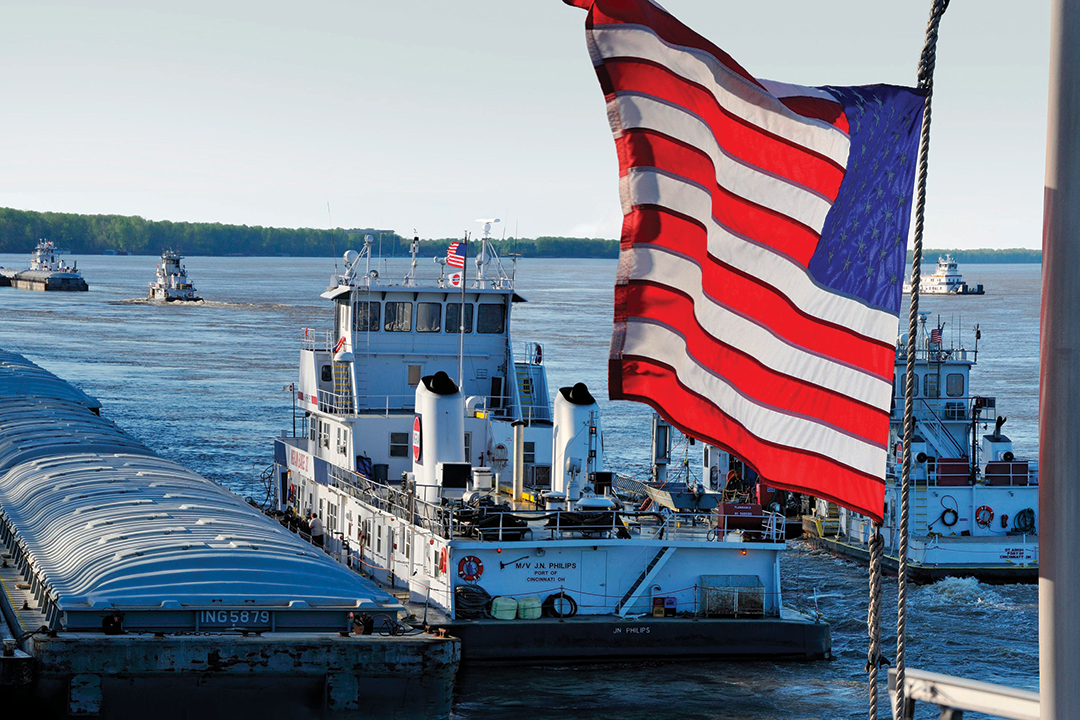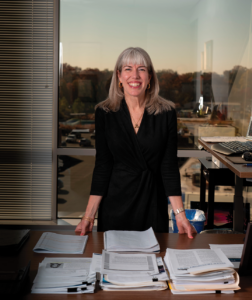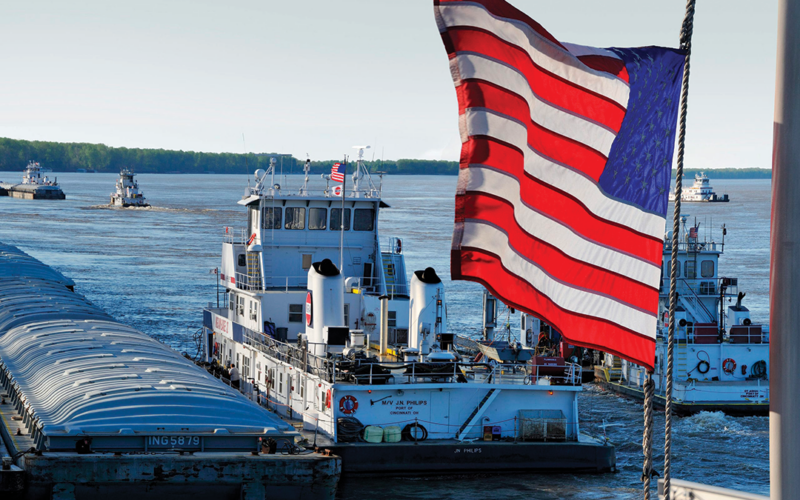
Jennifer Carpenter, CEO of the American Waterways Operators (AWO), has, in addition to her responsibilities at AWO, assumed the position of president of the American Maritime Partnership (AMP), which bills itself as the “voice of the domestic maritime industry.”
 The industry “is led by 650,000 American men and women who are committed to ensuring a reliable supply chain, reducing our dependence on China, dredging new channels for trade, building next-generation vessels, constructing the next great American energy industry, and supporting our military in times of war,” she said when the announcement was made of her January appointment.
The industry “is led by 650,000 American men and women who are committed to ensuring a reliable supply chain, reducing our dependence on China, dredging new channels for trade, building next-generation vessels, constructing the next great American energy industry, and supporting our military in times of war,” she said when the announcement was made of her January appointment.
The AMP is a coalition of vessel owners and operators; shipbuilders and repair yards; shipboard and shoreside workers; equipment manufacturers and vendors; dredging and marine construction contractors; maritime trade associations; and national security organizations.
In a broad sense, the domestic maritime industry encompasses all commercial vessels operating on American rivers and lakes; tug, barge and tow operations in U. S. ports; and vessel sea trades between the U. S. mainland and Hawaii, Puerto Rico, Alaska, Guam, and other overseas territories.
The AWO represents inland and coastal tugboat, towboat, and barge operators, and is a member of the AMP as is the Lake Carriers Association. Both AMP and AWO are headquartered in Washington, D. C.
With more than 30 years of experience in the maritime industry, Carpenter is a seasoned source for relevant Congressional committees, the Army Corps of Engineers, and the Coast Guard.
According to Carpenter, vessel and crew safety, manpower recruitment, industry growth, environmental concerns, and preservation of the Jones Act are paramount issues for both the coming year and the foreseeable future.
She affirms that the Jones Act “is the statutory foundation of our industry. We do not support any changes to the Jones Act and we believe that agencies should interpret it as Congress intended.”
Proposed changes to the Jones Act currently include calls to allow foreign crews on vessels operating in the domestic trades, which have been sought by several powerful organizations advocating for revisions to the 123-year-old law.
“We want to do a better job of telling our industry’s story,” she said. “Letting interested people know that, if you don’t want a desk job, there’s an industry here that offers a chance to be on a ship. It’s not for everybody, but for those who want something different, it’s an option.”
AMP members sponsor industry apprenticeships and career open houses. The umbrella organization educates the public about the achievements of the domestic maritime industry and its workers, with a grassroots program called American Maritime Voices, aiming to “fight for a strong American maritime industry.”
Carpenter points out that her own career is an example of a person who didn’t really know anything about the opportunities of the maritime industry, despite growing up in St. Louis, Mo., a major hub where vessels operate on the largest river system in the U.S.
“I had to move to the Washington D.C. area to find out about an industry that was literally in my own backyard,” she said.
On the vessel safety front, Carpenter emphasizes the essential nature of “proactively” working with the U.S. Coast Guard and the Army Corps of Engineers on crucial issues such as dredging, traffic management, storm preparation for operators in hurricane zones, and the placement of buoys relevant to waterways and port harbors. “We want to get ahead of the curve on safety and regulatory issues as much as possible.”
Working in that manner within the industry and with the Coast Guard and other relevant agencies on safety issues has paid off over the past 30 years, Carpenter explained.
As an example, fatalities among crew members on freight-carrying towing vessels have been reduced from a high of 34 Fatalities per One Hundred Thousand Employees (FTE) in 1997, to just four fatalities per FTE in 2022, according to the latest figures included in a 2023 report compiled jointly by the AWO and the Coast Guard.
In the past few years, low-water conditions on the Mississippi River and other waterways, while gradually lessening, have posed serious safety challenges that have been addressed with deeper dredging, a process that some members of the public find controversial.
In ‘silver lining’ fashion, Carpenter sees an opportunity for dredging operators to “educate the public on positive things that are being done with dredging material, such as shoring up beaches.”
Looking ahead to major areas of growth for the nation’s maritime industry, Carpenter foresees “the biggest opportunity” in the continuing construction of vessels and barges specifically designed to transport construction materials, equipment, and personnel to and from the offshore wind farms that dot the U.S. coastline.
At the same time, Carpenter says the industry needs to work with offshore wind operators and relevant agencies to ensure that the siting of offshore wind farms is safe and “does not block vessel channels.”
On the environmental front, an important concern for all vessels over 79 feet that operate in U.S. waters is the passage of the 2018 Vessel Incidental Discharge Act (VIDA) and the Environmental Protection Agency’s associated Vessel Incidental Discharge National Standards of Performance.
The proposed rules were published in the Federal Register for public comment in 2020, and then updated in 2023 with ‘A Supplemental Notice of Proposed Rulemaking.’
The new rules, from legislation strongly supported by AWO, aim to reduce the environmental impact of discharges into waters that are incidental to the normal operation of commercial vessels, such as ballast water or towline lubricants. They are intended to streamline the current “patchwork” of federal, state, and local regulations covering incidental discharges.
Carpenter welcomes the streamlining and consolidation of current regulations that her organization supported. She emphasizes, however, that industry representatives must engage closely with the EPA to ensure that the new rules reflect the input of the industry.
Another area of concern to domestic carriers are regulations or legislation designed to reduce harmful emissions into the air. These are growing in importance as the domestic maritime industry, in line with the global maritime industry at large, is charged with meeting “green” or “zero carbon” goals.
One such example is the California Air Resources Board’s Harbor Craft regulation. First proposed in 2022, it mandates that tugboat, towboat, and ferry operators to install Tier-3 or Tier-4 engines outfitted with diesel particulate filters (DPFs) by December 2024.
Various maritime organizations, including the AMP, contend that the regulations mandate the installation of potentially faulty, and often unavailable equipment, and are working together to lobby the state agency to scrap or, at least, substantially revise them.
Looking ahead to new shipbuilding activity for the domestic maritime industry, Carpenter noted that many shipyards have seen a “slowdown in demand” over the past several years.
It’s a situation driven by several factors, including the “very high cost of steel” and the economic slowdown caused by the COVID-19 crisis; yet she sees a modest uptick in shipbuilding demand as new opportunities for U.S. vessel operators develop.
Both the COVID crisis and the ripple effect of the memorable supply chain breakdown of 2022 – that found major U.S. West Coast ports clogged with freight vessels waiting for days to be worked – supplied another “silver lining” for the industry “to tell the public our story,” said Carpenter.
“Suddenly, everybody was talking about the supply chain, dependence on China, and other things that we in the industry have been talking about all along.” •

